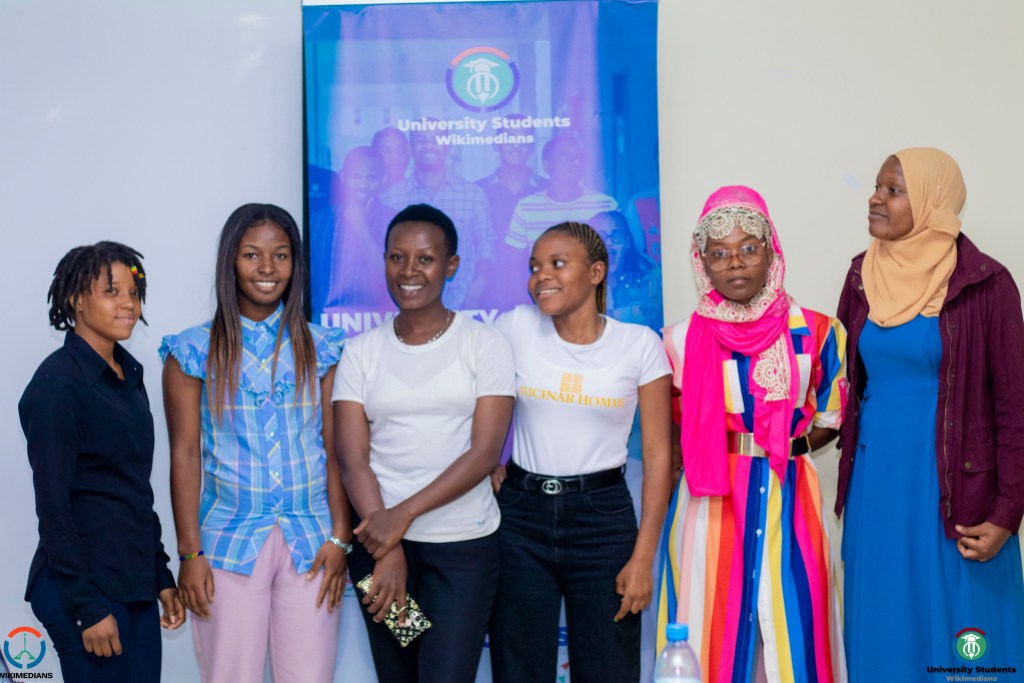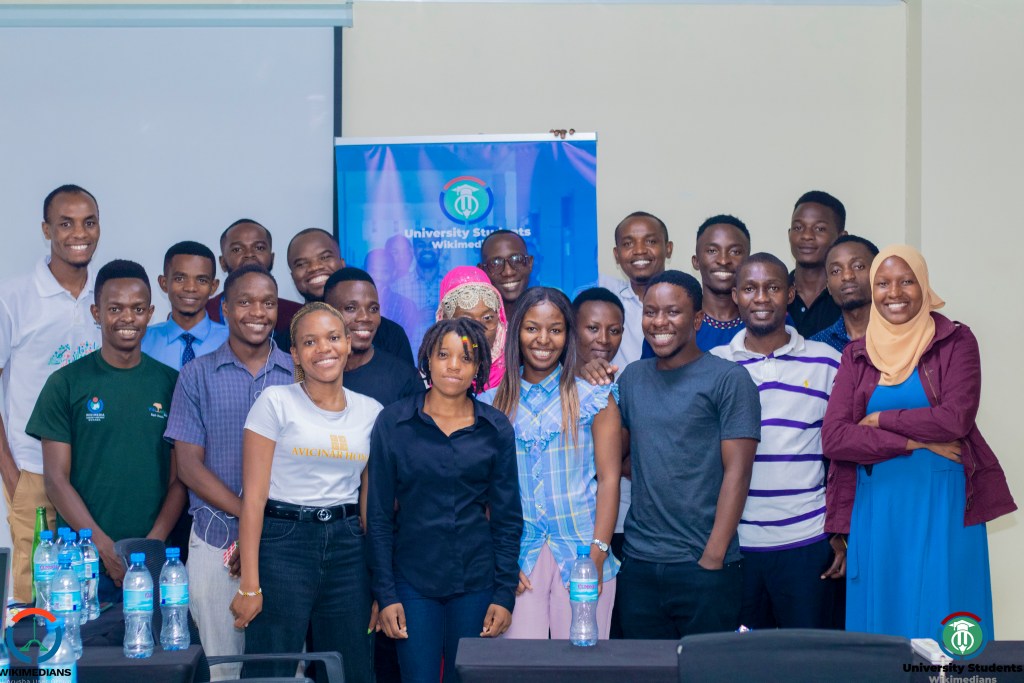
A tale of trailblazing students, a linguistic revival, and the fight against the gender gap on the internet.
Introduction: The Dawning of a New Era
Welcome to the latest blog post edition of the Tanzanian University Students Wikimedians User Group, where we shine a spotlight on the incredible community of students who are contributing to the world’s largest open-source knowledge platform. Women in Wiki is a celebration of the female editors, administrators, and activists who have dedicated their time, energy, and expertise to curate and expand the wealth of information available on Wikipedia and its sister projects.
Despite the progress made over the years, gender disparity in content and representation is still an ongoing challenge. In this edition, we aim to highlight an event from our community in the Morogoro region which was focused on bridging the gender gap in the Wikimedia projects. Through their efforts, these trailblazers are not only expanding the representation of women within the Wikimedia projects but also fostering an inclusive environment that welcomes diverse voices and perspectives.
Join us as we embark on a journey that showcases the extraordinary achievements of women within the Wiki community, as well as explore the initiatives and programs designed to support and uplift their work. Let us dive into the world of Women in Wiki and discover the power of collaboration, empowerment, and knowledge-building in shaping the future of open-access information.
In the heart of Tanzania, in the vibrant city of Morogoro, a group of intrepid university students embarked on a journey to break new ground in the digital world. Through their dedication and passion for knowledge, they sought to give voice to a language that has been long overshadowed and to the stories of women who have shaped history. It was a grand adventure, one that would leave a lasting impact on the Swahili-speaking community and the global quest for gender equality.
The seeds of change were sown at the Tanzanian University Students Community User Group community in Morogoro, where the air was charged with anticipation and the hope of a more inclusive future. These determined students, with the support of the Wikimedia Community Arusha, would challenge the status quo and redefine the narrative around women in the Swahili-speaking world. Their mission: is to create the first-ever Swahili Wikiquote articles celebrating the lives and contributions of women, and in so doing, to bridge the gender gap that exists on the internet.
The Event: A Convergence of Minds and Passions

The event, held in Morogoro, was a collaboration between the Tanzanian University Students Wikimedians User Group and the Wikimedians of Arusha communities. At the helm of this ground-breaking initiative were User:Magotech and User:CaliBen, experienced and dedicated Wikimedia trainers who would guide the participants through the intricacies of contributing to the Swahili Wikiquote. With the stage set and spirits high, the students eagerly embraced the opportunity to learn, create, and contribute to a more inclusive online world.
Throughout the event, the students engaged in hands-on training, where they learned the fundamentals of editing and creating Wikiquote articles in Swahili. With unwavering determination, they delved into the rich history of women who have made their mark in various fields, from science and technology to arts and culture. As they navigated the world of Wikiquote, the students not only honed their skills in Swahili language and research but also deepened their understanding of the importance of women’s representation in the digital space.
The training was both inspiring and rigorous, with the students working tirelessly to bring to life the stories of women who have shaped the Swahili-speaking world and beyond. As they delved into the rich tapestry of history, they discovered the untold stories of heroines, pioneers, and trailblazers, whose voices had long been silenced or overlooked. Through their hard work and dedication, these students would ensure that these remarkable women would be remembered and celebrated for generations to come.
Impact: Redefining the Narrative and Bridging the Gap
The impact of this event on the attendees was profound. As they contributed to the Swahili Wikiquote, the students gained a deeper appreciation of the gender gap that exists on the internet, and how their efforts could play a crucial role in bridging that divide. They understood the power of their work in not only preserving the Swahili language and culture but also in fostering a more diverse and inclusive digital landscape.
In total, 157 articles were created and 219 edits were made during the event, with a remarkable 533 article views. These figures are a testament to the students’ unwavering commitment to the cause and the potential for change when passion meets with knowledge and determination. Through their efforts, they have laid the foundation for a more balanced representation of women in Swahili Wikiquote and have sparked a movement that will undoubtedly continue to grow and flourish.
As we delve into the significant contributions made by women in the Wiki community, it is essential to recognize their undeniable impact on redefining the narrative and bridging the gender gap in content and representation. Here, we outline some of the key ways in which women have made a lasting difference in the Wikimedia projects.
- Diversifying Content: Women editors have played a vital role in identifying and addressing content gaps on Wikipedia, particularly in subjects where female representation has historically been overlooked or marginalized. By creating and expanding articles about influential women, underrepresented topics, and overlooked achievements, these editors have enriched Wikipedia’s content and provided a more comprehensive and accurate representation of women’s accomplishments across various fields.
- Encouraging Female Participation: Women in leadership positions within the Wiki community, such as administrators and functionaries, have been instrumental in fostering an inclusive environment that encourages more women to join and contribute. Through mentorship, outreach programs, and the establishment of safe spaces, these leaders have helped to promote gender diversity among editors, ensuring that a wider range of perspectives and expertise are represented.
- Advocacy and Awareness: Many women in the Wiki community have dedicated their time and efforts to raising awareness about the gender gap on Wikipedia and advocating for change. By participating in global campaigns, such as the annual #SheSaid, #WikiGap and #VisibleWikiWomen events, these activists have brought attention to the issue and spurred action to address the disparities that exist both within the Wikimedia projects and beyond.
- Education and Empowerment: Women-led initiatives, such as Wiki Women in Red and Art+Feminism, have been successful in providing resources, training, and support for female editors. These programs have empowered women to contribute their knowledge and skills to Wikipedia and its sister projects, resulting in thousands of new and improved articles.
- Building Global Networks: Women in the Wiki community have also been instrumental in fostering international connections, bridging cultural divides, and promoting cross-border collaboration. By participating in global conferences, meetups, and edit-a-thons, these women have helped to build a strong and interconnected network of editors who are committed to promoting gender diversity and inclusivity across the Wikimedia projects.
By redefining the narrative and bridging the gender gap, Women in Wiki are making a lasting impact on the future of open knowledge. Through their tireless efforts, they have not only expanded the horizons of information available to readers worldwide but also inspired a new generation of female editors and activists to join the movement and continue driving change.
Conclusion and Call to Action: Be the Change You Wish to See
As we reflect on the incredible achievements of these two communities in Tanzania (Tanzanian University Students Wikimedians User Group and Wikimedia Community Arusha), it is evident that the spirit of collaboration, passion for knowledge, and commitment to equality can truly change the world. The Women in Wiki initiative has not only created a more inclusive online space but has also inspired countless others to join the cause and work towards a more equitable future.
Now, we call upon you, our global community of Wikimedians, to join us in celebrating the accomplishments of these trailblazing students and continuing their important work. We urge you to contribute to the Swahili Wikiquote, to share the stories of remarkable women from all corners of the world, and to help bridge the gender gap in the digital landscape.
Together, we can create a world where the voices of women are no longer silenced or overlooked but are celebrated and cherished for their immense contributions to society. A world where the richness of the Swahili language and culture are preserved and shared with future generations. A world where knowledge knows no boundaries, and where diversity and inclusivity are embraced as the pillars of a thriving, interconnected global community.
Join us in this quest for change and let us write the next chapter of this epic adventure together. Contribute to the Swahili Wikiquote, share the stories of women who have inspired you, and be a part of the movement that is redefining the narrative around women in the Swahili-speaking world and beyond.
Let us forge a new path, celebrate the power of collaboration, and champion the cause of equality. Women in Wiki has shown us what is possible when we unite our efforts and work towards a common goal. Now, it is your turn to be a part of this story and to help shape the future of the internet – one article, one edit, and one story at a time.
Together, we are Women in Wiki. Together, we are the change-makers, the trailblazers, and the pioneers of a more inclusive and equitable digital world.
Join the movement, and let us make history.
Write us an email at hello@uswiki.africa or reach us via WhatsApp at +255685261018. Connect with us on our social media platforms: Facebook, Instagram, Twitter, and LinkedIn.

Can you help us translate this article?
In order for this article to reach as many people as possible we would like your help. Can you translate this article to get the message out?
Start translation